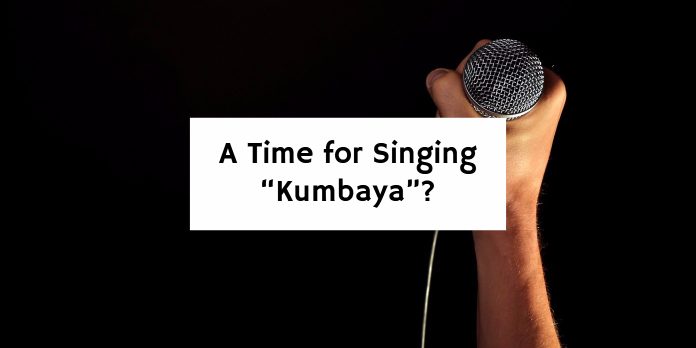In his latest Newsweek column, Fareed Zakaria discusses the views of people who think that President Obama’s call for a new global cooperation on nucelar disarmament is futile, even silly. As Zakaria characterizes this viewpoint, it assumes that nations like Russia and China are too self-interested ever to find genuine common ground. To ask them genuinely to cooperate is as ridiculous, as Zakaria puts it, as inviting the leaders of these nations to “all hold hands and sing ‘Kumbaya.’”
Singing “Kumbaya” is being held up quite a bit these days as something to be ridiculed. When Rahm Emanuel was asked by a reporter a while back about reports of tensions within President Obama’s top leadership team, Emanuel denied the rumors. “Of course, it’s not like we’re all sitting around singing ‘Kumbaya,’” he said; but no serious conflicts.
I don’t get it. What is it about sing “Kumbaya” that deserves to be ridiculed? For me, the song brings up an image of teenagers gathered around the bonfire on the last night of church camp. The kids have had their week of swimming, hiking, games and flirtations. And now, for a brief moment, they are in a reflective mood. Some of them are thinking with gratitude about the unique camaraderie that happens at summer camps. Others may be entertaining deeper thoughts, about what their lives are all about. They want the moment to last, and they are asking for a visitation to make that happen: “Come by here, my Lord. Someone’s singing. Someone’s praying. Come by here.”
Not all that bad, as teenage moods and experiences go. Why knock it? What makes people point to it as an example of phony unity?
Truth be told, when I see the sword-rattling that often characterizes the gatherings of international leader—and the acrimonious debates within our own public arenas in North America—I am strongly inclined to cry out in despair: “Come by here, my Lord, come by here!”
No one is ever going to ask me to lead devotions at a United Nations session or an Obama Cabinet. But if it were to happen—if it were—I know exactly what I would do. I would ask them all to join hands and sing “Someone’s crying, Lord! Someone’s crying! Kumbaya!” It would do them all good. And the Lord might even respond and actually “kumbaya”!
3 Comments »
-
As someone who (I am embarrassed to say) has participated in “Kumbaya mockery” in the past, I’d say that it is done most often because the image of people holding hands and singing together (much as you describe) is considered “naive” in the “real world.” We very much need the reminder that to reflect on our need for God and ask for God’s presence is anything but.
Comment by Mark Baker-Wright — September 30, 2009 @ 3:24 pm
-
Amen, Dr. Mouw, amen! It not only would do them all good, you are also right in thinking that the Lord might even respond and actually “kumbaya!” Great post!
-
In the military it is often invoked to assure our warriors that they will not have to leave their manhood at the door when they attend a marriage retreat or family gathering. For them much of what passes for “unity” speech or conflict resolution is simply capitulation of one’s values or beliefs to someone else’s completely. They are not opposed to holding hands or singing in unity, listen to Marines singing the Marine Corps Hymn some time. For them it represents capitulation to a perceived over-feminization of beliefs to the exclusion of their masculine instincts.
Comment by Tom Cook — October 4, 2009 @ 9:54 am






























